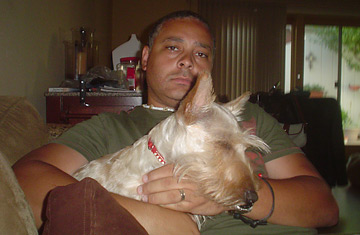
Steve Edwards
It took a few seconds for an Iraqi roadside bomb to rattle Sergeant Steve Edwards' head in December 2004. But it took 14 months for the U.S. Department of Veterans Affairs to compensate him for post-traumatic stress disorder (PTSD). During one stretch, Edwards called the VA weekly to plead for assistance. "I was saying we're about to be homeless," he says, "and all I got was some schmuck on the other line who says they're trying their best."
Now Edwards, along with hundreds of thousands of other veterans, is part of class action lawsuit against the VA asserting that that just isn't good enough. Filed Monday by a California public interest group and law firm on behalf of vets diagnosed with PTSD, the suit is the first to accuse the federal department of constitutional violations and to seek sweeping changes in its processing of disability claims. The VA is charged with "shameful failures ... to meet our nation's legal and moral obligations to honor and care for our wounded veterans" who fought in Iraq and Afghanistan. Without systematic reform, the suit contends, "the costs to these veterans, their families and our nation will be incalculable," and will contribute to a new generation of unemployed and homeless veterans and a burden on local social services.
Melissa Kaznitz, managing attorney for Disability Rights Advocates, a Berkeley nonprofit organization that is representing the vets, says the suit focuses on PTSD as a signature wound of ongoing wars. No court has previously been asked to order a systematic restructuring of the claims process at the VA, Kaznitz says, adding, "The VA has a culture of fighting the claims of veterans instead of fixing problems for the veteran. We're trying to fix the system."
The VA has seen its backlog of disability claims swell to 600,000 as soldiers return from ongoing wars, a logjam blamed for financial dislocation, despair and even suicides of vets. The suit says the claims system is "riddled with inconsistent and irrational procedures" that violate the due process rights of injured vets seeking care and compensation. For example, the VA employs the same officials both to challenge and judge claims.
According to the suit, the biggest casualties of this bureaucratic morass are the unprecedented number of troops returning with PTSD, a mental disorder especially prevalent in soldiers stationed in Iraq and Afghanistan, where they're faced with multiple tours of duty, invisible battle lines and the "moral ambiguity of killing combatants dressed as civilians." The military says more than a third of the 1.6 million men and women who have served in Iraq or Afghanistan report mental health issues ranging from PTSD to brain injuries, yet only 27 of the nation's 1,400 VA hospitals have programs dedicated to treating PTSD. Worse yet, the complex process of applying for disability payments is especially daunting for these patients, who often experience memory lapses and disorientation.
VA Secretary Jim Nicholson, who is named in the suit, recently ordered the hiring of new mental health personnel, amid criticism that he dropped the ball on soldiers returning from Afghanistan and Iraq; he also directed all VA hospitals to screen for PTSD among vets from those wars. Last week, however, he announced his resignation from the VA. The department declined to comment on the suit, saying only that it is "committed to meeting the special needs of our latest generation of heroes" and that it has given "priority" to disability claims.
Edwards, 41, an Army National Guardsman from San Jose, Ca., began suffering migraine headaches soon after the December 29, 2004, attack in central Iraq left him stunned and nauseous. He returned home in February 2005 and continued to have other PTSD symptoms, including nightmares, rage, sleeplessness and anxiety. Unable to return to his work as an audiovisual technician, he lived for several months on state unemployment compensation and the paycheck his wife brought home as an executive assistant for a software company. For months, Edwards didn't know he could qualify for disability payments until another vet suggested it.
He submitted a claim to the VA in June 2005, as his family struggled to make rent, student loans, car payments and clothing bills for his 10-year-old daughter. He waited for a response for 14 months. In August, 2006, Edwards received a rating of 80% disability and a monthly payment of $2,711. Frustrated by the year-plus delay, he says, "It didn't take me more than a week to get into the military. It shouldn't be that way" for the military getting compensation to its injured.
The lawsuit, filed in a San Francisco federal court, challenges the constitutionality of the claims system, citing a lack of neutral judges and prohibitions on vets' hiring lawyers at the initial phase of a case or demanding that the VA produce documents and witnesses that might shore up their claims. The plaintiffs seek no monetary damages, only an order requiring the VA to stop "illegal policies and practices," such as the months-long delays in reviewing claims and providing care to PTSD victims.
